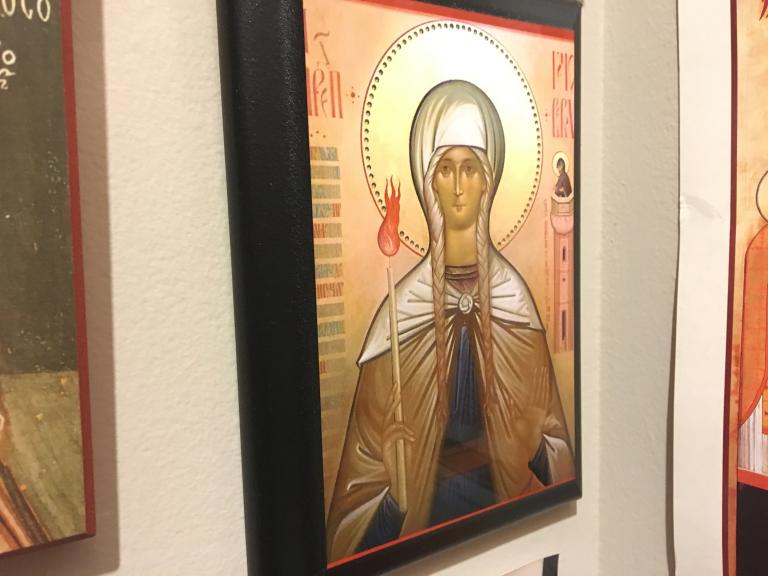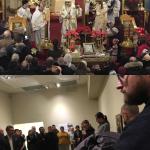
My wife’s name day falls on the commemoration of the Venerable Genevieve of Paris. My spiritual father and I discovered this fact while researching patron saints for my chrismation. I was thrilled to learn that my wife continues to be cooler than me. I have Holy Justin the Philosopher and Martyr, which fits my academic persona, but she has Genevieve of Paris. I mean, the Parisian thing is cool enough — its status as the romantic city in the world is trumped only in my view by Hong Kong — but her name is Genevieve.
I don’t think my wife was as excited about this discovery as me. For one, she is much less geeky than me. I am a professional nerd; she is radically oriented to the practices of everyday life. In fact, our joke in the house is that whereas the ordinary lives of normal people had to become my intellectual agenda in order for me to find it relevant, she simply lives it, seemingly effortlessly at most times. Of course, this means that she is smarter and more well-integrated than me.
Like the fact that my wife’s birthday coincides with the Nativity of the Theotokos and yet means nothing to us, I have become very suspicious of the easy association of the saint who is supposed to be her patron and who my wife actually is. For starters, Genevieve was a virgin monastic; unless my wife only exists in a dream, I am pretty sure she is not. One might say that it’s special that her patron is an Orthodox saint from the West, to which I reply that we are Hong Kong people living in a trans-Pacific world. You could say that I have come to appreciate the Saturday Vigil because Holy Genevieve was so devoted to it that one day en route to the service, she was able to re-light a candle that had burned out by simply waving her hands over it. The problem is that it is I am among the few who like the Vigil service in our family; indeed, most people at both of the temples I attend find it too long. I like to joke that the fact that Holy Symeon the Stylite, to whom my spiritual father has a strong devotion, is pictured in the back of the icon of Holy Genevieve — rumor has it that he even wrote to her because he had a vision of who she was — is like my spiritual father watching my wife from the background, ready to help us when we need it. But it’s just a joke, and even though Freud says that there is always more to a joke than it being funny, all that that means is that it’s a free association with probably little spiritual significance.
And yet, I pray facing Holy Genevieve of Paris every day, which means that she also faces me from heaven, and one of the things that she reminds me of is how much my wife likes candles. We like to light them in church, and one time as we were doing so, she sang to herself, I’ll light a candle for you. I learned recently that the song is by Avalon, which indicates that another thing that my wife does effortlessly is to take in the various bits of popular culture, which for us includes contemporary Christian music, that she picks up and transform them into expressions of happiness. Candles, we find, are romantic gestures that lead to some kind of spiritual significance; as Hong Kong people, they are for us first symbols of romance that we then learn have some spiritual significance when we light them in front of icons at church. One time, we even lit one before the exposed Blessed Sacrament during a ‘Mercy Night’ at a local parish; that was when I had a serious flirtation with the Latin Church. Nowadays, we light the beeswax candles before the iconostas at the temple we attend.
I suppose what I am saying is that one of the ways that my marriage keeps me grounded is that I have become very suspicious of the cynical impulse to disdain popular romantic gestures and see in them a path to the spiritual. I guess this sensibility can be taken to the extreme, as has been done in various parts of the evangelicalization of the various Christian churches, where these impulses become institutionalized into gushing worship songs with questionable theological content, overdetermined notions of gender roles and courtship norms, and the attempt to adhere to models of the Christian life that have no correlation with the way that the everyday works. That being said, my wife and I find remarkable theological entertainment on Christian radio, particularly in the fact that the Newsboys’ hit ‘God’s not dead’ advances a liberal Schleiermacherian view of the resurrection: God’s not dead, he’s surely alive, he’s living on the inside, roaring like a lion. In fact, the reason I remain attuned to the nuances of evangelicalism most days is because I still regularly listen to Christian radio.
The problem, of course, lies in the institutionalization of romantic gestures as a pathway to the spiritual. I am not talking about that. What I am saying is that what we are doing is at the level of everyday life, where we as people raised in a consumeristic culture on the Pacific Rim, which is itself a neoliberal geography that overdetermines regional market integration, discover in our everyday practices unexpected spiritual significance and try to understand them. Part of that stumbling around led me to the Kyivan Church, and part of how we make sense of our lives in this ecclesia in which we did not grow up is to correlate it with the stuff we did grow up with, which are these little gestures of everyday romance. I like to think that Holy Genevieve of Paris and Holy Symeon the Stylite would approve. After all, does not the contemplation of the world by which cities were built — indeed, upon which the romantic city of Paris was founded as that which the characters of Anastasia remind us ‘holds the key to your heart’ — suggest that much of what it means to be a Christian is to discover the supernatural in the unexpected sites where the world that the Lord made and the cultural geographies that persons cultivate by inhabiting it?












